 |
 |
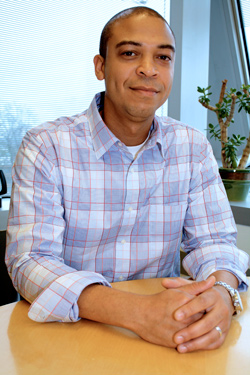
|
|
Zayd Khaliq, Medical Scientist (Neuroscientist), Cellular Neurophysiology Unit, National Institute of Neurological Disorders and Stroke (NINDS), National Institutes of Health (NIH)
|
1. I chose this career because...
2. My typical workday involves...
3. What I like best/least about my work...
4. My careers goals...
5. When I'm not working, I like to...
6. There are two qualities that I believe are necessary to become a good neuroscientist…
|
|
1. I chose this career because...
|
Back to Top

|
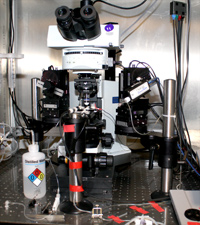
|
|
Zayd works in an instrument room, as shown, that includes a microscope and a device to measure voltage changes across brain cell membranes.
|
I chose to become a medical scientist because of my lifelong curiosity with nature and its inner workings. This interest was sparked during childhood conversations with my father. He is not a scientist himself, but is very curious about the planets and the surrounding universe. The early conversations that we shared were likely a critical starting point in my path to becoming a scientist. As a student in elementary school, I was lucky to have a very talented fifth grade teacher who taught me the basics of chemistry, including the names of the various subatomic particles and the concept of atomic orbitals. It was then that I began to appreciate the real beauty of science and I have been hooked ever since.
As a college student, I continued to pursue my interest in the natural sciences taking classes in mathematics, physics and chemistry. Following graduation, I worked as a research assistant in an atomic physics lab and found that I really enjoyed experimental science and the academic environment. After attending a basic neurobiology course, I decided that neuroscience was the field that most captured my interests and entered graduate school shortly afterward.
As a beginning graduate student coming from primarily physical sciences background, I learned that neuroscience is very broad field that includes concepts from a wide variety of disciplines. I worked hard to fill the gaps in my knowledge about the basic cell biology of neurons. However, I also found that my background in physics became an advantage when applied to studying the electrical properties of neurons (electrophysiology). Studying questions in electrophysiology was a natural progression of my interests.
Education
|
|
2. My typical workday involves...
|
Back to Top

|
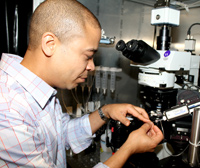
|
|
Zayd adjusts a glass pipette to set up for running an electrophysiology experiment.
|
A typical workday for me starts with setting up for experiments. A typical electrophysiology experiment takes 5-7 hours from start to finish, and usually contains very little downtime. On the days that I am not experimenting, I analyze data and read the scientific literature. I also attend seminars and review manuscripts from other scientists looking to publish their findings.
Tasks I perform in various roles:
- Researcher: As a researcher, my main task is to identify important biological questions, design and perform experiments, analyze data and make conclusions based on this data.
- Writer: In addition to generating scientific findings, a large part of my job is to communicate our research to a larger audience. I do this primarily by writing and submitting manuscripts for publication in scientific journals.
- Speaker: To further communicate our research, I give public talks at neuroscience departments across the country (and sometimes even internationally). I also attend conferences where I present posters of our work and discuss it with other scientists who have similar interests.
- Supervisor: As the Principal Investigator, I am responsible for supervising projects for all students and postdoctoral researchers in the lab.
- Mentor: Scientific training is an apprenticeship and mentoring is a critical component of this training. As a mentor, I share scientific and career advice that I have accumulated during my time in science.
My Research in Neuroscience
The brain is composed of networks of neurons that communicate using both electrical and chemical signals. However, one largely unanswered question in all of neurobiology is ‘what are the natural activity patterns of neurons within a behaving organism and how are they generated?’ The research in my lab focuses on the electrical activity of neurons that release a chemical neurotransmitter called dopamine. Dopamine plays a key role in the ability of people to generate movements, and the death of these neurons leads to severe motor deficits as seen in Parkinson's patients. In addition, dopamine neurons are central for signaling during receipt of natural rewards (e.g. food, sex, etc.). The dysfunction of these neurons lies at the root of addiction to nearly all drugs of abuse. The goal of my research is to understand how reward-relevant signals are generated in dopamine neurons of normal animals and how this activity differs in addicted animals.
|
|
3. What I like best/least about my work...
|
Back to Top

|
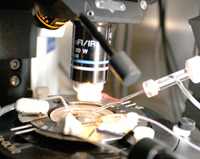
|
|
A small pipette that has less than a micron-sized tip and contains an electrode, is inserted into a slice of brain tissue to measure electrical activity of cells.
|
The thing that I like best about my job is generating new information about important questions that relate to the physical world. Contributing to the growing knowledge of how the brain works is very rewarding for me.
I also really enjoy designing and performing experiments. Running electrophysiology experiments is very much an active process. Many times we design experiments based on what we know and make predictions about the outcome of the experiment. During many experiments though, we see things that are unexpected and need to adjust our protocols accordingly. This makes performing experiments an engaging and very exciting process.
The hardest part of my job is being able to identify the important questions and to make working on these questions a priority. Many scientific questions are difficult, and solving them is very time consuming. Therefore, it is necessary to make wise decisions on which experiments to pursue.
|
|
4. My careers goals...
|
Back to Top

|
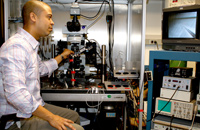
|
|
Zayd makes precise adjustments to his experiments and can view them in real time on a computer screen.
|
My goals are to continue to conduct research that offers insight into the mechanism of firing in dopamine neurons. I would also like to expand these studies in the future to include addicted individuals, and to further our knowledge of the pathophysiological changes that occur throughout the reward system during addiction.
|
|
5. When I'm not working, I like to...
|
Back to Top

|
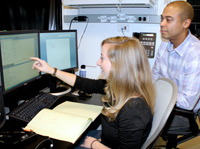
|
|
Zayd plays the role of mentor in his laboratory, and plans and discusses experiments with his mentee.
|
When I'm not working, I try to spend most of my free time with my family. I enjoy reading to, and playing with my children. I also like to go jogging. For most of my childhood through college, I played the violin. Although I only occasionally play now, I still enjoy listening to classical and contemporary music.
|
|
6. There are two qualities that I believe are necessary to become a good neuroscientist…
|
Back to Top

|
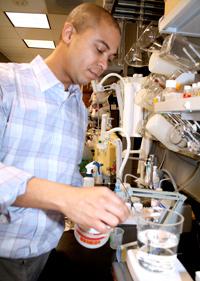
|
|
| |
Zayd prepares a solution for his experiments that mimics cerebrospinal fluid (the fluid in and around the brain and spinal cord).
|
There are two personal qualities that I believe are necessary to become a good neuroscientist. First, I think it is important to be relatively tough-minded. Experiments fail more often than not, so it is important to be undeterred and to continue pushing through despite the failure. Second, and most critically, I think it is important to be a curious person. Curiosity, or that “need to know” is what propels most scientists forward through the rugged terrain of the unknown, and acts as the engine of scientific discovery.
|
|
|
|
 |